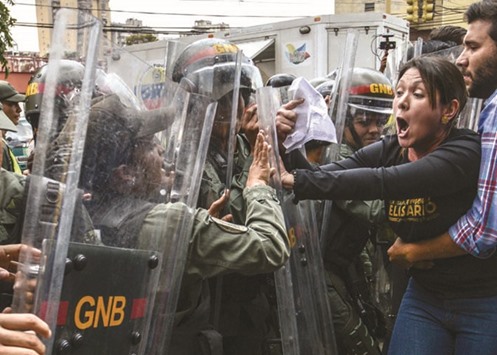President Nicolas Maduro and his allies tightened their grip in Venezuela yesterday as the Supreme Court seized legislative powers from the opposition-majority National Assembly, whose speaker declared a “coup”.
The high court, whose judges have staunchly backed the leftist president in a power struggle with the legislature, based its decision on an earlier ruling that the opposition majority was in contempt of court.
“As long as the National Assembly’s contempt of court and invalidity persist, parliamentary powers shall be exercised directly by (the Supreme Court’s) constitutional chamber or by the body it designates to safeguard the rule of law,” it said late on Wednesday night.
Political analysts warned the ruling was a sharp authoritarian turn for the South American oil giant, where a crushing economic crisis has caused food shortages, riots and an epidemic of violent crime.
The speaker of the National Assembly, Julio Borges, called the decision “rubbish”.
“Nicolas Maduro has staged a coup in Venezuela,” he said in a fiery speech outside the National Assembly.
He urged the army, which has thus far supported Maduro, to take a stand.
“The Venezuelan armed forces cannot remain silent as the constitution is breached,” he said, appealing to soldiers who are also suffering through what he called the “chaos” of the economic crisis.
The court’s argument cited its own ruling in January 2016 that the National Assembly leadership was in contempt for swearing in three lawmakers who were banned over alleged electoral fraud.
The opposition Democratic Unity Roundtable (MUD) condemns the fraud charges as a trumped-up bid to curb its power after it won a landslide in legislative elections in December 2015 with a promise to oust Maduro.
The elections forced the president and his allies in the United Socialist Party of Venezuela (PSUV) to share power for the first time since its founder, the late Hugo Chavez, launched Venezuela on the path of leftist “revolution” in 1999.
But the Supreme Court scuttled the opposition’s powerful two-thirds majority when it suspended the three investigated lawmakers.
Since then, the court has overturned every law passed by the legislature.
Venezuelan political analyst Carlos Romero warned that “democracy is in danger” in the country.
“We’re talking about an indiscriminate and illegal use of the Supreme Court’s powers to do away with the legislative branch,” he told AFP.
“To legally overtake the functions of a branch of government is a coup,” said Latin America specialist Christopher Sabatini of Columbia University in New York.
The ruling came a day after the Organisation of American States (OAS) held a special meeting where 20 countries voiced concern about the situation in Venezuela, drawing a furious reaction from Maduro.
The meeting was the international community’s latest effort to get to grips with Venezuela’s unravelling, which has the rest of Latin America worried.

Venezuelan opposition deputy Amelia Belisario scuffles with National Guard personnel in riot gear during a protest yesterday in front of the Supreme Court in Caracas.
